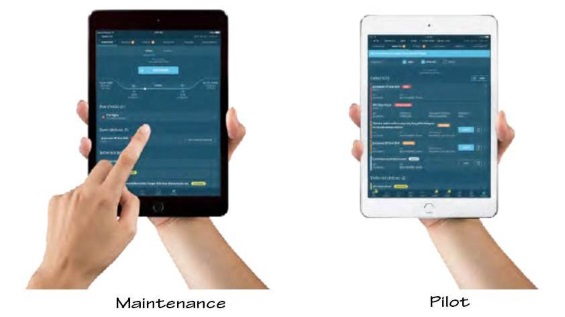TECHLOG: NEW APPLICATION TO OPTIMIZE AIRLINE MAINTENANCE PROCESSES
01 Aug 2017
{{vendor.Name}}
Connect with Aircraft IT
Sign up to the Aircraft IT twitter feed for all the aviation industry's latest IT related news
Click here to learn about free Membership to Aircraft IT
TECHLOG: NEW APPLICATION TO OPTIMIZE AIRLINE MAINTENANCE PROCESSES
01 August 2017 – On-time performance has become crucial in the aircraft maintenance process. Airlines can no longer wait for a paper technical log report to be retrieved by maintenance operators at the end of a flight to start dealing with defects. That is why Thales now offers a new application, Techlog, to optimize further airline maintenance processes.
Maintenance operators must be capable of preparing defect management as soon as the aircraft lands and anticipating the actions to be conducted even before landing. Every minute gained in the treatment of a defect will contribute directly to more efficient maintenance operations and to optimized turnaround time.
As part of its AVIOBOOK Electronic Flight Bag solution, Thales has developed the Techlog application removing maintenance operators from the need to go and fetch pieces of paper in aircraft, deciphering handwritten logs and re-entering information in the airline’s Maintenance Information System.

Seamless flow of information between all players on ground and on board
Techlog is a part of the comprehensive aircraft operations suite AVIOBOOK, currently used by 34 airlines in 18 countries. With Aviobook Techlog, defect information entered by pilots goes directly to the Maintenance Information System of the airline on the ground. When completed, repair operations, servicing or checks reported by maintenance operators are sent back to the application. The information flows seamlessly between all players on ground and onboard the aircraft to improve the efficiency of the maintenance process.
Aviobook Techlog solution includes a module for pilots, an application for maintenance operators, a web-portal and a ground interface included in BASE, the ground management system. Each interface has been designed with human factor specialists to be fully tailored to end-users’ working habits.
Human errors can be drastically reduced with the elimination of misunderstanding when deciphering handwriting, thus avoiding a waste of time and potential wrong repair operations. With more accurate information provided by Techlog, regulatory compliance will be better ensured.
Reducing drastically human errors
This application is fully configurable to airline operations. It can be adapted to airlines’ ways of working, not the other way around. Thus, servicing units, check types and frequencies can be configured. Types of defects can be pre-defined to ease reporting by flight crew and pave the way for predictive data analytics.
Flight crew can also report de-icing liquids used, remaining fuel and uplifts enabling airlines to cross-check information with the fuel providers’ bills instantly and without human intervention. Maintenance operators are able to detail deferrals, maintenance actions, servicing and checks performed. In addition, an alert is raised when a deferral or a check is about to expire.
Cybersecured by Thales
Aviobook Techlog fully manages electronic signature and qualification. Only authorized users can perform aircraft release in accordance with the airline’s policy. A system based on QR codes has been set up to reduce human error. The QR code placed on each aircraft ensures that the maintenance operator is reporting on the right aircraft.
It also contributes to the cyber-security of the system to protect airlines’ data integrity and privacy. Thanks to Thales’s experience and know-how in the field of cyber security, Aviobook Techlog is secure. Last, with paperless defect reporting, there is no more need for physical storage of hard copies. A full historical overview of the technical status of an aircraft can be obtained at a glance.
______________________________________________________________________________
Each interface has been designed with human factor specialists to be fully tailored to end- users’ working habits
